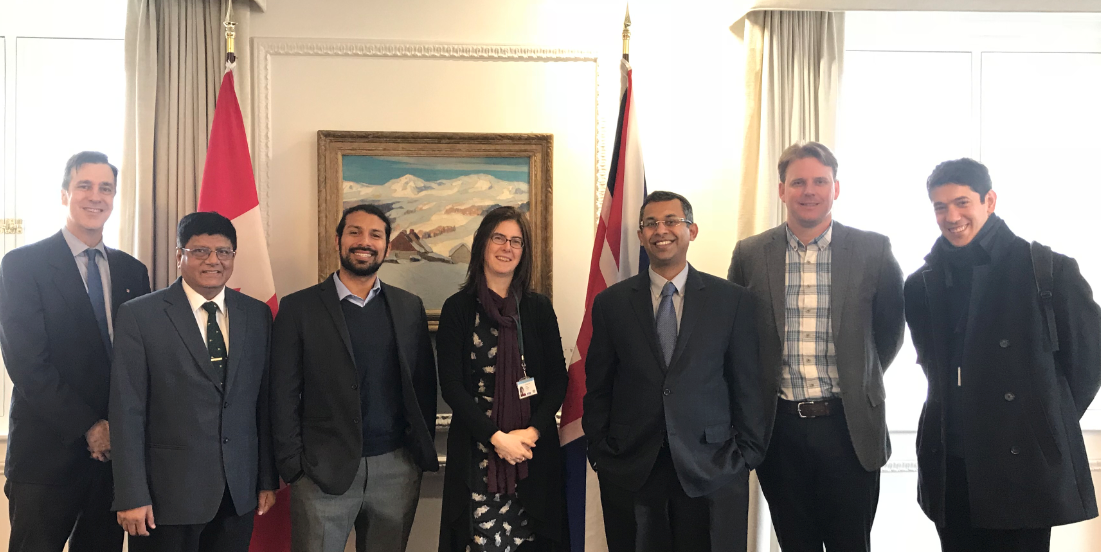Internationalizing research has come to be seen to be critical. It takes the best minds from around the world – each bringing their own insights, wisdom, and experiences – to tackle the world’s most pressing problems and its most exciting opportunities. Increasingly, collaborative, transnational research is vital to knowledge breakthroughs.
To help to internationalize the NSERC Energy Storage Technology Network, a team of six travelled to the United Kingdom in March 2018 to interact with researchers, technicians, businesspeople, and government representatives on energy storage issues.
The United Kingdom was a logical location for this first NEST Network international mission for a variety of reasons. First, energy storage is a key part of the United Kingdom Government’s agenda going forward – it is central to the ‘Clean Growth’ theme, which is one of four ‘grand challenges’ that is guiding industrial strategy (.pdf) in the country.
Second, Canada and the United Kingdom have committed to strengthened cooperation in the fields of science, technology, innovation, and entrepreneurship. ‘Sustainability, renewable energy and clean technologies’ is one of the six priority areas that have been identified.
And third, the two countries have, of course, a long history of political, cultural, and economic interaction, let alone the educational connections that exist. Sixteen of the world’s top 100 universities are in the United Kingdom.
Mission membership represented all four NEST Network themes:
- Theme 1 – Dr. Bala Venkatesh (Ryerson University) -> Project 1.5 (Hybrid ES System Designs) and Project 1.6 (Design of Pole-Top ES)
- Theme 2 – Dr. Lukas Swan (Dalhousie University) -> Project 2.5 (Control Systems for Second-Life Batteries for Grid Scale-ES)
- Theme 3 – Dr. Mariano Arriaga (University of Waterloo) -> representing Dr. Claudio Canizares, Project 3.5 (Operation and Control of Power Systems with ES Systems); Dr. Bala Venkatesh (Ryerson University) -> Project 3.7 (Capacity Markets for ES)
- Theme 4 – Dr. Kankar Bhattacharya (University of Waterloo) -> Project 4.3 (Provision of Ancillary Services by ES); Dr. Ian Rowlands (University of Waterloo) -> Project. 4.6 (Social Acceptance of ES Systems)

L to R: Ian Rowlands, Kankar Bhattacharya, Mariano Arriaga, Sally Fenton (Department for Business, Energy & Industrial Strategy (BEIS)), Bala Venkatesh, Lukas Swan, John Hasar (Department for Business, Energy & Industrial Strategy)
Network Manager Karen Ho-Cespedes was also part of the Mission. Dr. Venkatesh, as project Principal Investigator, often represented the project as a whole during discussions, and Dr. Rowlands also supported the ‘internationalization’ theme of the Mission, drawing upon his day-job experience at the University of Waterloo (Associate Vice-President, International) and his own familiarity with the United Kingdom.
The Mission itinerary was built around participation in the UK Energy Storage Conference. Mission members found it to be a pleasure to interact with more than 250 participants at this conference. The depth of discussion and the range of topics presented were particularly impressive. Side meetings during the conference served to enrich the discussions even further, as did engagement with the broader Newcastle energy ecosystem.
Bookended on either side of the conference were ‘business days’ in two of the UK’s major cities.
On Monday, the Mission’s members had a series of meetings in London, discussing Canadian and UK developments with the Department for Business, Energy & Industrial Strategy (the lead government department responsible for, among other things, the industrial strategy), the Energy Networks Association (the industry association representing transmission and distribution network operators in the UK), and the Energy Futures Lab at Imperial College (one of the world’s leading research centres). Colleagues at the High Commission of Canada in the United Kingdom were extremely helpful in facilitating much of this activity.
And on Friday, a series of meetings in Glasgow were held, at which discussion on similar issues took place, but the particularly Scottish angle on challenges and opportunities was also highlighted. Interactions with Scottish Development International, Scottish Enterprise, and the Energy Technology Partnership provided a very useful range of perspectives; a site visit to the Power Networks Demonstration Centre was another highlight. The British Consulate-General in Toronto was key in catalyzing this day’s agenda.
Follow-up on many leads is now underway. Indeed, that is one of the elements that is most critical to the eventual success of any mission. Having scanned a broad landscape, the task is then to identify those areas that make most sense to pursue. An execution strategy subsequently needs to be developed. It is certainly the case that this particular Mission revealed many promising candidates for further attention.
Additionally, development of the Network’s broader internationalization strategy is also well underway. This will be a topic of discussion at the 2018 NESTNet Week, and another blog post reporting on the outcomes of that discussion will follow.